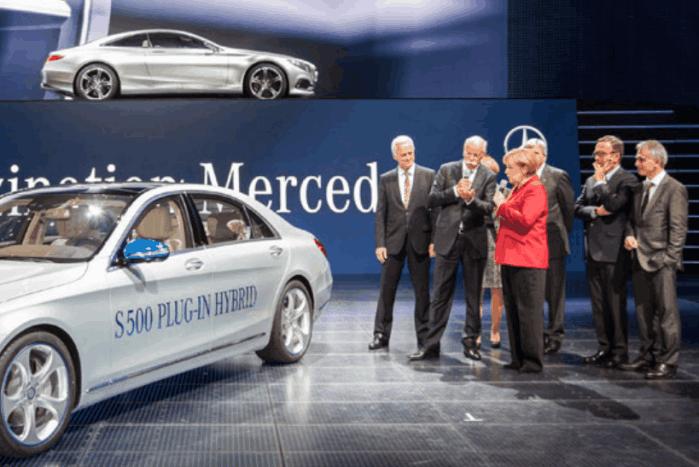
In the grand chessboard of the global economy, the automotive industry, as an important piece, has a profound impact with every move. Recently, the implementation of a new round of US tariff policies has thrown German automotive companies into an unprecedented whirlpool of uncertainty, and the entire German automotive industry has been severely hit.
The United States is an important export market for German cars. German automakers such as BMW, Volkswagen, and Mercedes - Benz have not only invested in building factories in the US but also employed more than 138,000 local employees. Continental, a German automotive parts supplier, was the first to bear the brunt. On March 4, Continental released its annual financial report. This should have been a moment for the company to showcase its achievements and look ahead to the future. However, the news that Trump announced the imposition of high - import tariffs on Mexico, Canada, and other countries on the same day was like a bombshell, instantly causing Continental's share price to plummet, dropping by 11% at one point. Nikolai Setzer, CEO of Continental, said with deep concern: "This is not only a challenge faced by our company but also a common problem for the entire industry."
Hildegard Müller, President of the German Association of the Automotive Industry, also issued a stern warning. The act of unilaterally raising tariffs is like a sharp blade that will mercilessly disrupt the stability of the global supply chain, and the result will inevitably directly increase the burden on consumers. She further pointed out: "The erection of trade barriers will not only harm the European automotive industry but also, in the long run, greatly weaken the competitiveness of the United States itself." Volker Treier, Head of Foreign Trade at the German Chamber of Commerce and Industry, also believes that the US tariff policy is like a heavy punch that will directly impact German companies. On the one hand, it increases the export costs of German companies, and on the other hand, it seriously undermines the stability of the supply chain. Ultimately, the result is to drag down the economic growth of both sides, harming others without benefiting oneself.
From a macro - economic perspective, Sebastian Dullien, an economist at the Macroeconomic Policy Institute under the Hans Böckler Foundation in Germany, warned that if the trade conflict further escalates, German exports to the US are likely to experience their first decline in many years in 2025. Through data models, he predicted that if a full - scale global trade war breaks out, the German economy will be severely hit and may shrink by more than 1%. This economic contraction will directly lead to the loss of about 300,000 jobs, having a huge impact on German social stability and economic development.
In fact, the German automotive industry is extremely dependent on the US market. Take BMW as an example. The company has invested a large amount of manpower, material resources, and financial resources in the US market and has been deeply cultivating for a long time. However, the US tariff policy this time has put BMW in a huge crisis. A BMW spokesperson clearly stated: "Free trade is extremely important for BMW. The act of imposing tariffs will not only force the price of BMW products to rise, ultimately making consumers bear high costs and harming consumer interests but also seriously hinder the innovation pace of the entire industry, pushing the industry into a negative cycle and making it difficult to achieve sound development." According to BMW's disclosure on the 14th, the US tariffs on automobiles are expected to reduce BMW's revenue by 1 billion euros in 2025. What's more serious is that this may even lead to a "change in the company's business prospects," and its future development is full of uncertainties.
The dilemma of the German automotive industry is also reflected in the changes in the global market competition pattern. Data from the German Federal Motor Transport Authority shows that the number of newly registered pure electric vehicles in Germany increased by nearly 31% year - on - year in February this year, reaching 35,949 units, and the development momentum of new energy vehicles seems good. However, Tesla, an American brand that once led the global new energy vehicle market, has suffered a setback in the German market. In February, only 1,429 units were newly registered, a year - on - year decrease of 76%. This sharp contrast to some extent reflects that the US tariff policy not only affects the German automotive industry but also, conversely, weakens the competitiveness of its own automakers in the international market, and the influence of American automotive brands in the global market is being impacted.
In the face of the impact of US tariff policies, German automotive companies are not sitting idly by. On the one hand, companies are re - evaluating their investment strategies and trying to adjust their global layouts, attempting to find new development directions in this trade storm. For example, some companies are considering increasing investment in other emerging markets, opening up new sales channels, and reducing their dependence on the US market. On the other hand, German automotive companies are also accelerating their own electrification transformation process, hoping to enhance product competitiveness through technological innovation and product upgrades to cope with the dual pressures from US tariff policies and global market competition. BMW regards electric vehicles as the main growth driver. In 2024, its electric vehicle sales increased significantly, reaching approximately 427,000 units, and this growth trend is expected to continue in 2025. Volkswagen is speeding up the launch of low - priced electric models to attract a wider range of consumers and seize market share in the electrified market.
However, it cannot be ignored that many factors, such as the uncertainty of global economic recovery, the continuous fluctuations in international trade policies, the technical bottlenecks in the process of electrification transformation, and the fierce competition pressure from emerging markets, will pose long - term tests to the future development of the German automotive industry. How to maintain competitiveness in the complex and changeable global market and how to successfully find new growth points in the wave of electrification have become key issues that the German automotive industry urgently needs to solve in the next few years.

Amidst the global wave of technological transformation, artificial intelligence (AI) has become a key focus of competition among major tech giants.
Amidst the global wave of technological transformation, art…
In January 2026, the remarks by US Treasury Secretary Besse…
Less than three weeks into 2026, transatlantic trade relati…
On January 17, 2026, the Trump administration, under the pr…
When Musk set the goal of achieving a launch frequency of m…
A week after the largest nationwide protests in years, the …